Beware of the what video games are doing to your brain, or to the brain of your child!
In Nicholas Carr’s book Utopia is Creepy, he has a chapter called ‘Grand Theft Attention’, where he reviews the latest research on video games and the brain. The chapter is a reprint of his 2011 blog post ‘Grand Theft Attention: video games and the brain.’
A 2009 study by a different group of Iowa State researchers, published in Psychophysiology, investigated the effects of video-gaming on cognitive control, through experiments with 51 young men, both heavy gamers and light gamers. The study indicated that video-gaming has little effect on “reactive” cognitive control – the ability to respond to some event after it happens. But when it comes to “proactive” cognitive control – the ability to plan and adjust one’s behavior in advance of an event or stimulus – video-gaming has a significant negative effect. “The negative association between video game experience and proactive cognitive control,” the researchers write, “is interesting in the context of recent evidence demonstrating a similar correlation between video game experience and self-reported measures of attention deficits and hyperactivity. Together, these data may indicate that the video game experience is associated with a decrease in the efficiency of proactive cognitive control that supports one’s ability to maintain goal-directed action when the environment is not intrinsically engaging.” Video gamers, in other words, seem to have a difficult time staying focused on a task that doesn’t involve constant incoming stimuli. Their attention wavers.
Further Reading



